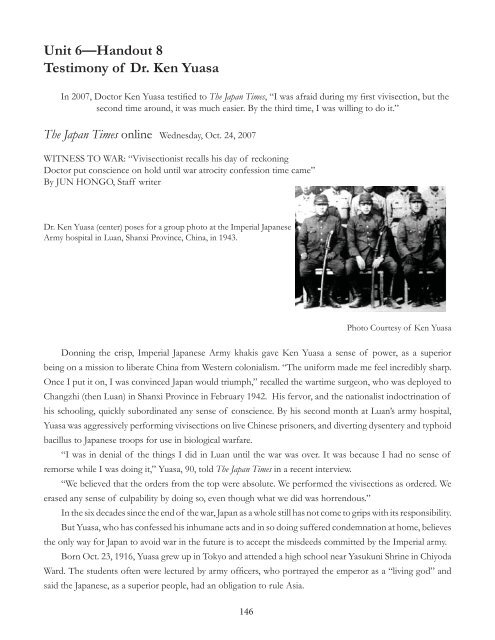Download - Canada ALPHA
Download - Canada ALPHA
Download - Canada ALPHA
You also want an ePaper? Increase the reach of your titles
YUMPU automatically turns print PDFs into web optimized ePapers that Google loves.
Unit 6—Handout 8<br />
Testimony of Dr. Ken Yuasa<br />
In 2007, Doctor Ken Yuasa testifi ed to The Japan Times, “I was afraid during my fi rst vivisection, but the<br />
second time around, it was much easier. By the third time, I was willing to do it.”<br />
The Japan Times online Wednesday, Oct. 24, 2007<br />
WITNESS TO WAR: “Vivisectionist recalls his day of reckoning<br />
Doctor put conscience on hold until war atrocity confession time came”<br />
By JUN HONGO, Staff writer<br />
Dr. Ken Yuasa (center) poses for a group photo at the Imperial Japanese<br />
Army hospital in Luan, Shanxi Province, China, in 1943.<br />
146<br />
Photo Courtesy of Ken Yuasa<br />
Donning the crisp, Imperial Japanese Army khakis gave Ken Yuasa a sense of power, as a superior<br />
being on a mission to liberate China from Western colonialism. “The uniform made me feel incredibly sharp.<br />
Once I put it on, I was convinced Japan would triumph,” recalled the wartime surgeon, who was deployed to<br />
Changzhi (then Luan) in Shanxi Province in February 1942. His fervor, and the nationalist indoctrination of<br />
his schooling, quickly subordinated any sense of conscience. By his second month at Luan’s army hospital,<br />
Yuasa was aggressively performing vivisections on live Chinese prisoners, and diverting dysentery and typhoid<br />
bacillus to Japanese troops for use in biological warfare.<br />
“I was in denial of the things I did in Luan until the war was over. It was because I had no sense of<br />
remorse while I was doing it,” Yuasa, 90, told The Japan Times in a recent interview.<br />
“We believed that the orders from the top were absolute. We performed the vivisections as ordered. We<br />
erased any sense of culpability by doing so, even though what we did was horrendous.”<br />
In the six decades since the end of the war, Japan as a whole still has not come to grips with its responsibility.<br />
But Yuasa, who has confessed his inhumane acts and in so doing suffered condemnation at home, believes<br />
the only way for Japan to avoid war in the future is to accept the misdeeds committed by the Imperial army.<br />
Born Oct. 23, 1916, Yuasa grew up in Tokyo and attended a high school near Yasukuni Shrine in Chiyoda<br />
Ward. The students often were lectured by army offi cers, who portrayed the emperor as a “living god” and<br />
said the Japanese, as a superior people, had an obligation to rule Asia.


